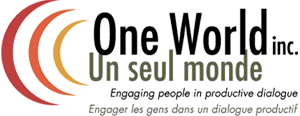Bridging the Gap Between Policy-Makers and Citizens
 In 2009, the city of Edmonton created a citizen panel to examine ways to invest municipal tax money. The panel was comprised of 49 randomly selected residents who met six times to discuss spending priorities. They had access to in-depth information, including budget documents, growth plans, and infrastructure issues. They really dug into this issue, and after the intensive process, they offered several recommendations to the City Council as they created the 2010-2011 budget. So often we feel disconnected from such high-level decisions. Citizen panels are a way to create a bridge between policy-makers and citizens.
In 2009, the city of Edmonton created a citizen panel to examine ways to invest municipal tax money. The panel was comprised of 49 randomly selected residents who met six times to discuss spending priorities. They had access to in-depth information, including budget documents, growth plans, and infrastructure issues. They really dug into this issue, and after the intensive process, they offered several recommendations to the City Council as they created the 2010-2011 budget. So often we feel disconnected from such high-level decisions. Citizen panels are a way to create a bridge between policy-makers and citizens.
Like the Edmonton panel, an important feature of citizen panels in general is the time taken to become informed (but not an expert) on the issue at hand. This is hard to do in a one-off engagement, so these panels commit to meet several times to learn and become well informed about the issue, from a variety of persepectives.
The intent of participating in a citizen panel is not to come to the sessions with an opinion or a position, which you hope to defend. It is about coming with an open mind, listening to others with that open mind, weighing different possibilities and working to explore potential solutions or avenues for action based on common values and understanding of what is important to citizens. The panels provide the opportunity for deep deliberation and dialogue around a topic.
Citizen panels are not a panacea; they take time, may not be fully representative of the entire community, and are, by nature, limited in terms of participation. They do, however, help provide a more nuanced view of the public judgement citizens arrive at when they have a chance to be well-informed and think an issue through with others. This is very different than the “top-of-mind” opinions we get through public opinion polls. And panel members often report that they feel more connected to processes and policies and have a greater appreciation for the difficult work our politicians have in making tough trade-offs across multiple interests.
Citizen panels are not meant to be the only method of public engagement. Deliberative dialogues, community meetings, interviews, focus groups, and other engagement processes are still important and useful. The panels, though, are a valuable addition to the toolkit.
